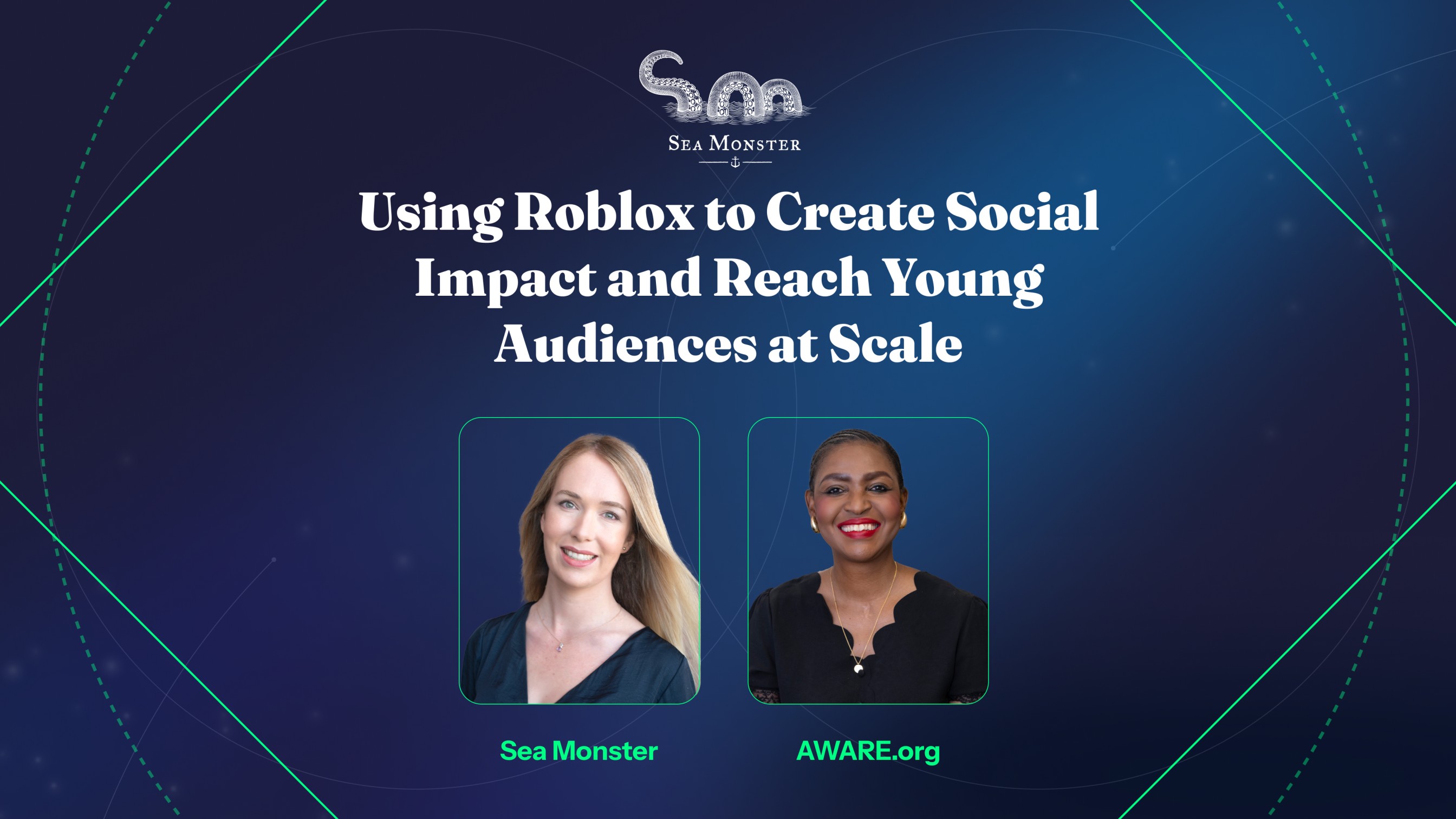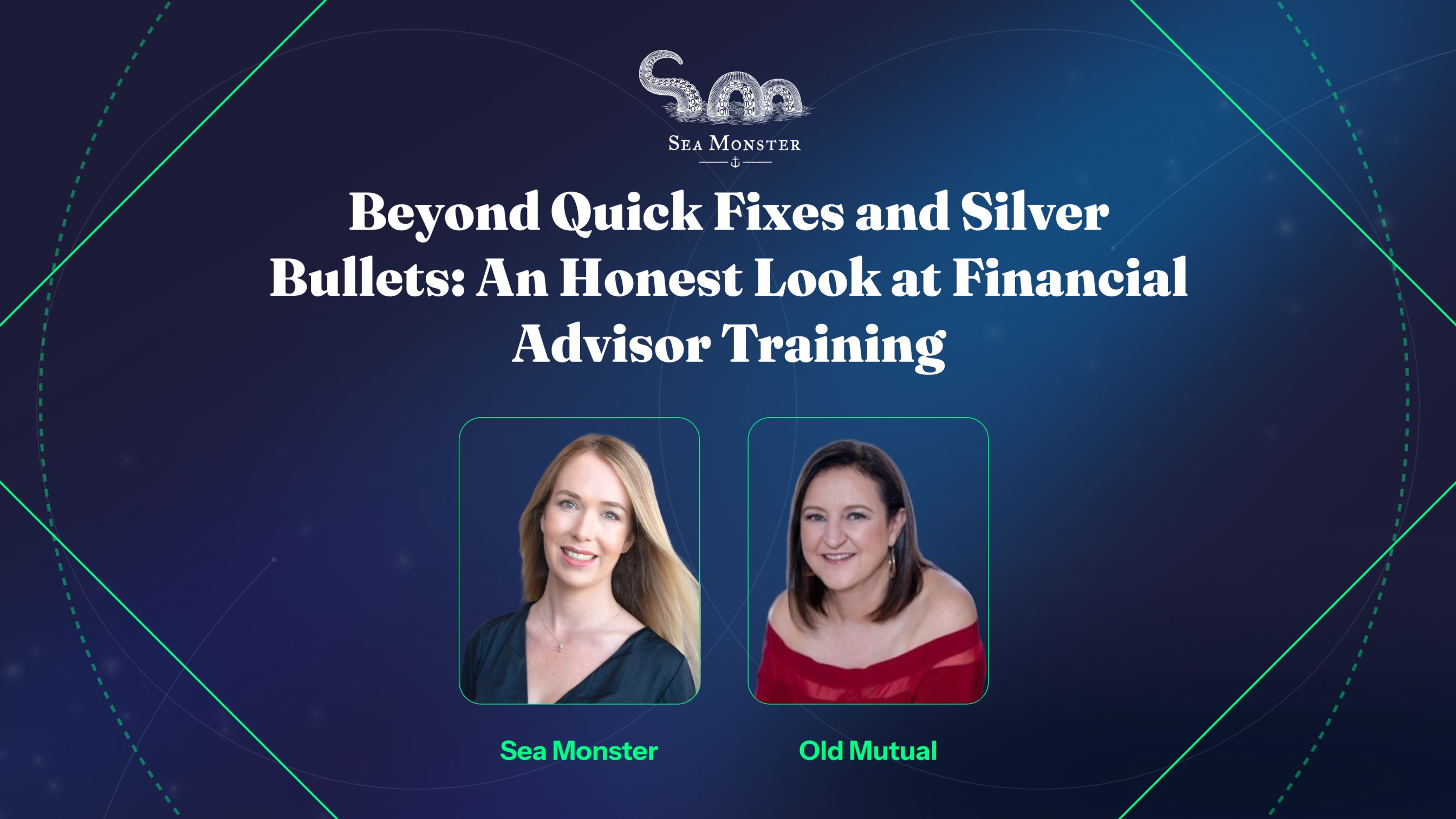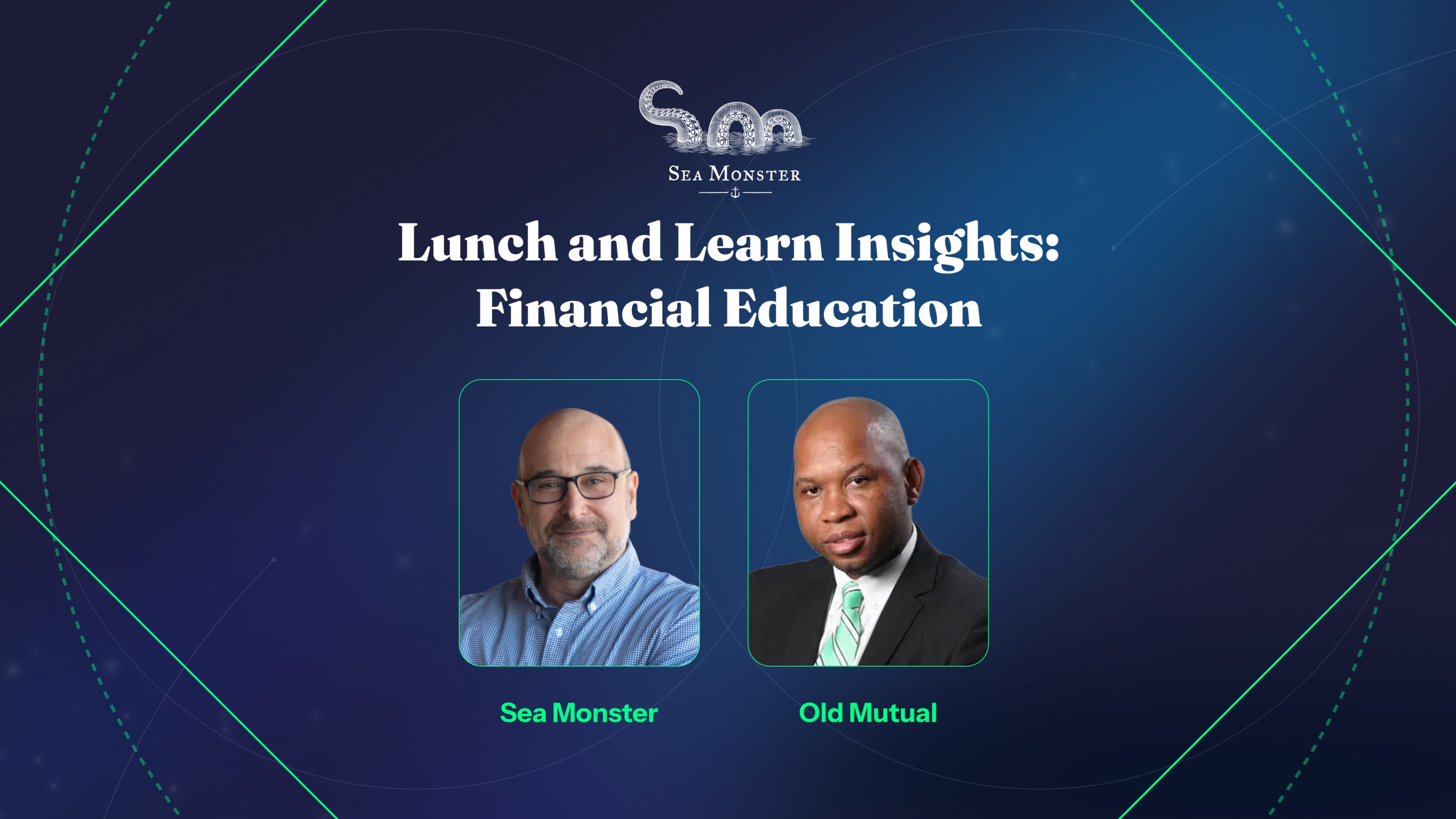South Africa's youth face an underage drinking crisis driven by family role modeling, peer pressure, and apathy about their futures. Traditional awareness campaigns aren't working. Gen Alpha and Gen Z want to be co-creators, not passive listeners, even when the message could save their lives. In a recent conversation, Mokebe Thulo, CEO of Aware.org, and our Creative Director at Sea Monster, Jade Duckett revealed how they tackled this problem by meeting young people on Roblox. Their insights on data-driven iteration, consequence-free exploration, and building intergenerational conversations challenge what you might think you know about social impact messaging.
The cultural competition problem
Aware.org faces a challenge most brands would recognise: capturing youth attention in an oversaturated media landscape. But their challenge carries additional weight given they're working to prevent underage drinking in South Africa, where failure isn't just lost engagement, it's potentially lost lives.
"We are competing with culture," Mokebe explains. "When a young person takes their time to consume whatever you are putting out there, whether it be an advert, whether it be a game, you are competing with any other thing that they could be doing at that specific time."
This reframes the entire approach to social impact messaging. The competition isn't other awareness campaigns, it's sneaker drops, TikTok videos, concert tickets, and every other element of youth culture vying for attention.
Mokebe notes. "It's about understanding where your target audience is, specifically the youth. Understanding what makes them tick, what drives them, in order for you to even think about being able to create any behavioral change."
The philosophy that changes everything
What sets Aware.org, and its campaigns, apart is a fundamental philosophy: don't preach.
It sounds simple, but it represents a profound shift. Rather than positioning themselves as authorities dispensing wisdom to passive recipients, Aware.org focuses on understanding the pressures young people face and giving them the tools to navigate complex situations themselves.
"We are very much data-led, data-driven," Mokebe emphasizes. "It's not about just concocting and creating messaging that maybe sounds really attractive. It's about finding out who your audience is, finding out where they are, and finding out what culture means to them."
This led to a crucial realisation: young people don't need more finger-wagging about alcohol's dangers. They need spaces to explore consequences, practice decision-making, and develop resilience without real-world risks. This meant venturing into the world of games.
Enter Roblox: the solution
When Aware.org decided to create a game for young people, they didn't initially know where it would live or what form it would take. The breakthrough came when Roblox was put on the table: with hundreds of thousands of monthly active users in South Africa, almost entirely under 18 and with virtually no local content targeting them, the platform was an immediate fit.
"At the beginning of the journey, I didn't even know about the existence of Roblox myself," Mokebe admits. "One of our colleagues has a son who spent a lot of time on Roblox, and that's how the initial idea came about."
The partnership between Aware.org and Sea Monster has now produced multiple Roblox experiences, making Aware.org the South African organisation with the most campaigns on the platform. But getting there required creative problem-solving around significant constraints.
The creative challenge of invisible alcohol
Roblox's strict community guidelines, in place to safeguard its young users, presented an interesting challenge for an alcohol awareness campaign: you can't actually show alcohol or mention drinking directly on Roblox.
"I remember that first moment of reading the guidelines to go, okay, so we need to talk about the importance of not drinking underage, but you can't mention drinking and you can't show alcohol bottles," Jade recalls.
What initially seemed like a limitation became a creative catalyst. Unable to rely on explicit messaging, the team had to dig deeper into the actual drivers of underage drinking: peer pressure, social media embarrassment, lost opportunities, and damaged relationships.
"I think it actually worked to our advantage," Mokebe reflects. "It forced us to be so much more creative. Because our content speaks to the real drivers of the behaviour”
The result? A series of games featuring relatable scenarios: a character who posts something embarrassing on social media after overdoing it at a party. An athlete who misses crucial practice because of poor choices the night before. A zombie party where players encounter different archetypes (the crying bathroom zombie, the aggressive zombie, the cringe zombie) all representing recognisable consequences of partying too hard.
The power of consequence-free exploration
What makes gaming particularly effective for social impact work is the ability to explore consequences without experiencing them in real life.
"It gives you a safe space to engage with this content," Jade explains. "Maybe you fail the first time, and maybe you would choose different dialogue options next time, or maybe you would avoid the party completely in the future."
The games position players as heroes helping others who've made poor choices, rather than as potential offenders being warned away from bad behavior. This subtle shift in framing changes everything about how the message lands.
"Fundamentally, it's about you deciding, as the young person," Mokebe emphasises. "We are showing you what could be. If you make this set of decisions, you could land yourself in this specific situation. It's not judgmental on any level."
The messaging comes through helpful in-game characters who act as peers who gently remind players about consequences while offering support. "Oh, man, I'm so sorry you overdid it, but remember, next time... here's a little bit of water, drink it, and go get some sleep."
Data-driven iteration
Unlike traditional awareness campaigns that launch and hope for the best, the Roblox experiences provide continuous feedback loops that allow for real-time optimisation.
"We have a feedback box where players tell us all of their unfiltered opinions of the games that we make," Jade shares. "We then share a report of that with the AWARE team."
The feedback is brutally honest, which is to be expected when your audience consists of young people. But this direct line to player sentiment, combined with Roblox’s extensive in-built metrics on user behaviour like session length, return frequency, and engagement patterns, allows the team to continuously improve.
"If our game goes live today, if after 2 or 3 days we're seeing a sort of pattern that's not of any value to us, we pivot," Mokebe explains. "We pivot right then and there. We don't wait until the end to call it ‘a learning’."
This agile approach also extended to the advertising strategy as well. When certain promotional channels showed stronger traffic patterns, resources were immediately redirected. When incentive structures seemed to attract players more interested in free avatar items than the actual experience, the focus shifted to making the gameplay itself the primary draw.
Beyond the game: opening family conversations
The Roblox experiences we co-created exist within a broader initiative called Makers of Tomorrow - Aware.org's umbrella platform addressing underage drinking through multiple touch points including TikTok series, TV show integrations, community radio campaigns, and wall murals.
But critically, the approach also targets parents and caregivers, recognising that one of the biggest drivers of underage drinking is family role modelling.
"Adults, caregivers, etc., sending their kids to go purchase alcohol for them, or to go pour them a drink… A lot of that access that young people have to alcohol is within the household," Mokebe notes.
The gaming experiences, particularly when played in shared family spaces, create opportunities for intergenerational conversations that might not otherwise happen. A parent watching their child navigate a virtual house party gone wrong can ask: "Have you ever been in a situation like this? What would you do if a party got out of hand?". For us, that’s one of the most important roles of the game.
What's next?
For Aware.org, success isn't measured purely in player numbers, although engagement has been impressive. The deeper goal is behavioral change, which exists on a spectrum.
"There'll always be people that are at different learning points. But to plant the seed is important for us." Mokebe acknowledges.
This approach recognises that behavioral change rarely happens through a single touchpoint. Success requires:
- Consequence-free exploration: Safe spaces where young people can practice decision-making without real-world risks
- Peer-led messaging: Guidance that comes from relatable characters, not authority figures
- Continuous iteration: Real-time pivots based on player feedback and engagement data
- Intergenerational bridges: Creating opportunities for conversations between young people and their caregivers
- Most importantly, it requires meeting young people where they already are- in the digital spaces they've made their own.
The challenge facing social impact organisations isn't just about creating better awareness campaigns, it's about fundamentally rethinking how we engage young people on topics that matter. The solution lies not in choosing between education and entertainment, but in finding the sweet spot where both amplify each other. Where games create safe spaces to explore difficult choices. Where consequences are real enough to teach, but contained enough to encourage experimentation. Where behavioral change happens not through fear, but through understanding.
In a country where underage drinking remains a persistent challenge, this approach isn't just innovative marketing, it's planting seeds for a healthier generation, one Roblox post-party at a time.
To watch the full webinar conversation, check it out on YouTube here.
Are you looking for innovative approaches to youth engagement that combine gaming, data-driven insights, and authentic connection? Get in touch with Sea Monster to explore how we can help transform your social impact campaigns.


.svg)
.svg)






.gif)
